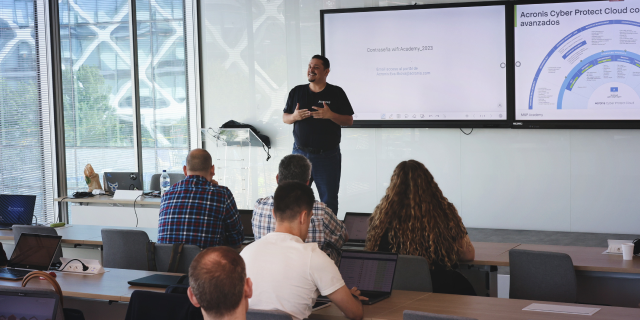CALL IT BEING GREEN or environmentally responsible, or call it lifecycle management or an environment, social, and governance (ESG) initiative, but enterprises today believe in sustainability. So do many SMBs. Twenty-three percent strongly agree with the idea that a robust ESG program helps their business, while 36% somewhat agree, according to SMB Group, a market research analyst and consulting firm. When your customers ask for help donating old systems, are you ready for this business opportunity?
According to the United Nations Environment Program, the world produces as much as 50 million tons of e-waste a year, and only 20% is formally recycled. Rather than put equipment in a dumpster, some companies go straight to an electronic recycler, or ecycler, which reclaims usable parts and materials and crushes the rest, but the effort keeps some material out of a landfill. Every major city now has companies advertising “electronics recycling,” but they range from responsible companies with strict privacy and data destruction policies to those that are one step above a junkyard. SMBs will look to their MSP to steer them in the right direction.
Avoiding the Landfill
Retired systems commonly have years of good use left after being donated, experts say. The first question for most companies is how to refurbish and reuse end-of-life hardware, says Laurie McCabe, cofounder and partner at the SMB Group, a market research analyst and consulting firm. “Take the latest and greatest [computers] from the execs down to other [employees who] don’t require that performance, trade in the old for new systems, or donate,” McCabe recommends. Data protection must be maintained, either by the customer, the MSP, or the refurbishing/recycling service, she says.

Susan Krautbauer
If you want to pass along usable equipment from your SMB customers, there are multiple options at Digitunity, a national nonprofit based in North Conway, N.H. Digitunity works with tech companies to donate recycled and refurished computers, laptops, and tablets to 1,500 nonprofits in good standing with the IRS and communities across the country that align with their goals.
Working directly with companies or through MSPs, Digitunity arranges pickup for the donated systems, sends them to partners that wipe hard drives and refurbish reusable systems, and forwards them to nonprofits for distribution, says Susan Krautbauer, senior director of strategy and development. The donating companies can designate recipient groups in the Digitunity network, such as STEM or low-income students, older adults, and veterans’ support groups.
Loren Williams, an account executive/sourcing, at PCs for People, which provides recycled computers for low-income individuals and families and is based in the greater Chicago area, takes a similar but more direct approach. “From Baltimore to Denver, we pick up computers, take them to the nearest of our eight or nine warehouses, reformat or shred hard drives, and update them with Windows 10 since we’re a Microsoft-authorized refurbisher,” Williams explains.
The organization has distributed over 60,000 systems to low-income households—keeping 4 million pounds of electronics out of landfills, according to Williams. PCs for People often works with MSPs helping their own customers dispose of old electronics, and is looking to add more MSP partners.
How to Find a Program
McCabe says her research indicates that people do want to recycle. “Start with your hardware vendors like Dell, HP, Lenovo, since each has a good program,” she advises, adding that all the major tech vendors now have a strong commitment to sustainability, and programs are in place.
Many distributors have programs as well. Adam Rutstein, director of global corporate responsibility at Fremont, Calif.-based TD SYNNEX, calls it the circular economy. Shyft Global Services, a recently formed division of TD SYNNEX, offers safe IT asset disposition services of devices traded in to its Renew program. Customers can also work with the distributor’s Corporate Mobile Recycling company, which processes mobile devices.
“Many companies have ESG or corporate citizenship sections on their websites,” Rutstein adds, “and most large companies produce an annual corporate citizen report or equivalent to update stakeholders on their progress.” TD SYNNEX published its Global Ecosystem Benchmark Report in January 2023, highlighting opportunities for resellers to help their customers with their own sustainability efforts.
Krautbauer suggests MSPs include sustainability in their initial proposals to potential clients. “Think RFP, proposal, and presentation,” she says. “Address the impact of ESG and corporate responsibility to show you speak their language.” MSPs should also include their refurbish or recycle policies that save updated systems from going to the landfill.
Tracking Progress and Benefits
Donating companies may request documentation of the refurbish process. PCs for People will send the donors a data deletion or destruction certificate within a month, along with anonymized details about household income levels for the ultimate recipients, if requested.

Loren Williams
Williams says PCs for People provides a new option for companies that donate systems to track how much greenhouse gas emissions are saved by reusing computers. McCabe says some modules in ERP software will track a company’s practices. While enterprises often ask for that information, she says SMBs rarely feel that need. Both PCs for People and Digitunity say they report details of data destruction and delivery to a specified charity or assistance program.
Companies starting on their ESG journey can begin the process by forming a committee on ESG and assessing the topics to prioritize in their business, says Rutstein. “Get good quality data to understand your carbon footprint and set goals to reduce your environmental footprint.”
The urge to help the local community can be strong, but dealing with multiple school board and charity group requirements by yourself can be overwhelming. Think smaller, and you may find individuals able to help. Phil Shapiro reformats donated systems with Linux and gives them to low-income library patrons. “My title is Public Geek, Takoma Park Maryland Library,” Shapiro says. “I’ve been doing this for more than 25 years, repurposing around 900 systems.” Elementary students who received his free computers have graduated from Yale and Stanford, he notes.
Plenty of other families across the country are in similar situations as Shapiro’s library patrons, according to Pew Research, which found that “about four-in-10 adults with lower incomes do not have a home desktop or laptop computer.” Digitunity’s Krautbauer has explained to MSPs looking for skilled techs with certifications that if students have no computer at home they must go to the library and hope there’s one available, which can be a major barrier to achievement.
McCabe says that improving sustainability will not only help in terms of doing good, but that the process may also help financially. “You can save money and differentiate your company from others,” she says. “More and more people report they want to work with suppliers who regard sustainability the same way they do.” Younger generations lean green as well.
And there is another compelling reason to practice sustainability. “Regulations are coming that will require more sustainable practices, carbon credits, and reduced energy waste, and you want to be helpful down the road,” McCabe adds.
PCs for People’s Williams sells it another way. “We’re a good way to take away a headache for an MSP,” with regard to proper disposal of decommissioned computers and tablets. “We save you money, since there’s no employee time used, and protect your data.” His goal is to work with more MSPs and make it easy on them to satisfy their clients’ desire to refurbish or recycle outdated equipment.
Some donating companies spread the word about sustainability to increase employee engagement, adds Krautbauer. “eWaste drives, support for local groups, and distribution events locally show the public companies care about the community by reducing waste and helping groups.” Often, these events increase retention and recruiting, two areas that have become more difficult for organizations lately. “There’s huge value to that mission.”













